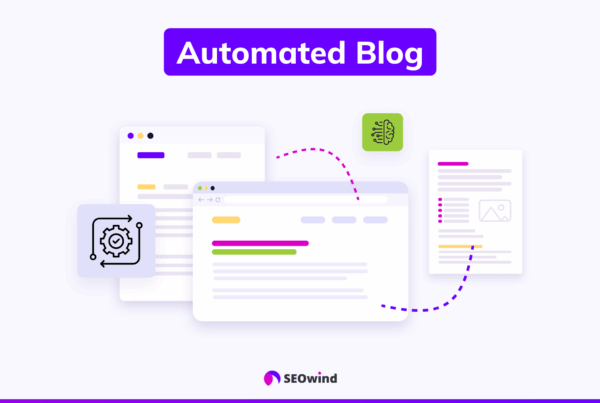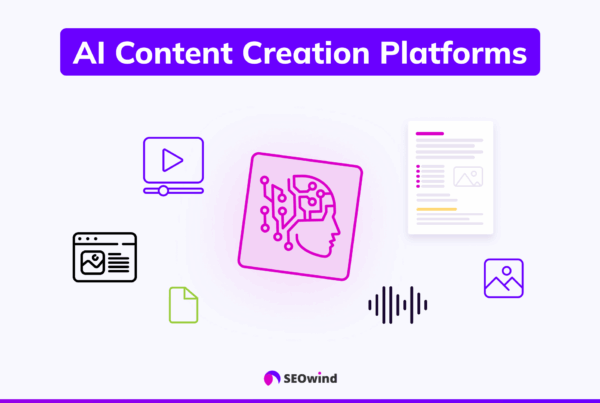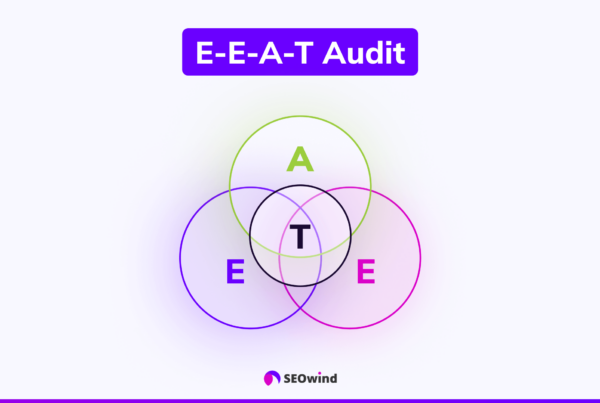Staying ahead in search rankings takes both smart strategy and efficiency. SEO automation has become a game-changer for businesses aiming to boost online visibility while maximizing their resources. This guide outlines how automation can transform your SEO efforts and deliver real results while highlighting important limitations and best practices.
What is SEO Automation?
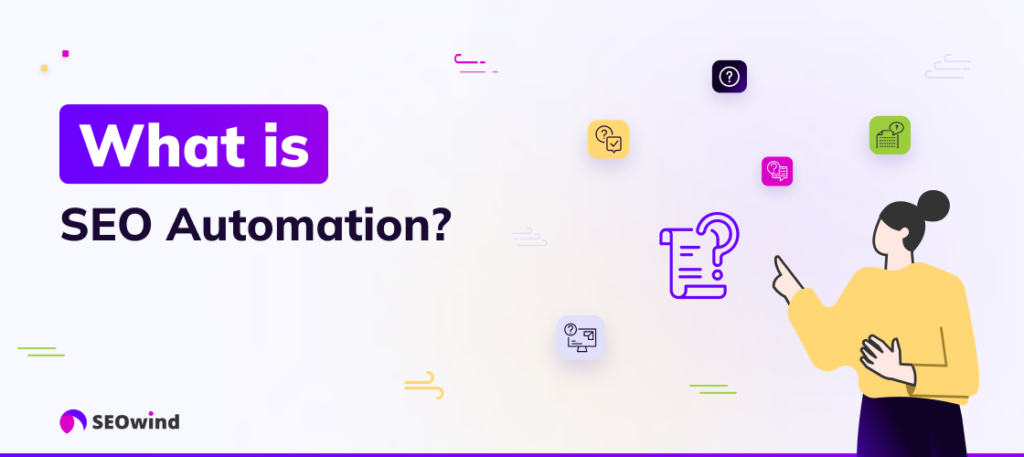
SEO automation blends human smarts with specialized tools to streamline campaigns and work more efficiently. At its heart, it’s about using tech to handle repetitive, time-consuming tasks. At the same time, SEO pros focus on strategy and creative work.
Modern SEO involves many complex processes – from finding the right keywords and optimizing content to running technical audits and tracking performance. Automation tools handle these routine tasks faster and more accurately than manual methods, saving you significant time while maintaining or improving quality.
According to industry data, 74% of marketers state that automation saves them significant time, freeing them to focus on strategic and creative work.
Benefits of Automated SEO
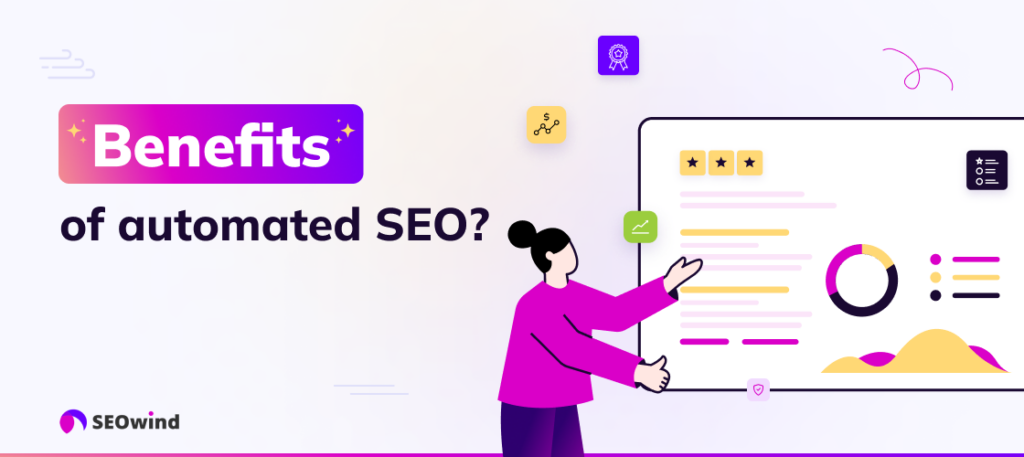
Time Efficiency and Productivity
When you implement SEO automation, you’ll see immediate efficiency gains. Influencer Marketing Hub Report (2025) shows that 15.6% of respondents save over 10 hours per week with AI SEO tools; 39% save between 1–5 hours per week. This speed boost lets teams accomplish more without adding resources.
The time savings really shine in research-heavy tasks. AI tools can find high-performing long-tail keywords 85% faster than manual methods, dramatically cutting research time while covering more ground.
What’s more automating SEO reporting can save agencies 2 hours per client each week – for an agency with 20 clients, that’s 40 hours saved weekly (Source: MetricsWatch, 2025).
Reduced Errors and Improved Accuracy
Even the most careful people make mistakes during lengthy manual tasks. Automation cuts down these human errors by performing repetitive processes with consistent precision. This matters especially in technical SEO, where small mistakes can significantly hurt performance.
Measurable ROI Improvements
The financial impact of SEO automation is compelling. 68% of marketers have seen a positive uplift in ROI after using AI. (Source: HubSpot). Businesses investing in AI for SEO have reported a 3% to 15% increase in revenue and a 10% to 20% uplift in sales ROI (Source: McKinsey, 2023).
According to SmartInsights data, businesses earn an average of over $22 for every dollar spent on SEO, with industry-specific ROI ranging from 317% for e-commerce to over 1,300% for real estate.
Real-time Data Monitoring and Adaptability
Automation tools keep an eye on things 24/7, alerting you to significant changes in rankings, traffic patterns, or technical issues. This means you can respond faster and adjust your strategy more quickly.
Companies using AI in their SEO strategies see their search engine rankings improve by 34% within the first month of implementation.
Potential Challenges and Limitations of SEO Automation
While automation offers huge benefits, understanding its limitations is crucial for building a balanced strategy. Industry experts point out several key challenges:
Limited Creativity and Strategic Insight
“AI can’t replace what humans are good at. It can handle lots of data and do repeated tasks well. Still, it doesn’t have the creativity, planning skills, or emotional understanding experienced marketers bring,” says Tom Winter, SEOwind founder.
Automation tools are great at processing data but struggle with:
- Developing unique brand stories
- Creating emotionally engaging content
- Aligning strategies with complex business goals
Understanding User Intent and Context
Search engines have gotten really good at understanding user intent, context, and language nuances through algorithms like RankBrain and BERT. However, automation often misses these subtle distinctions.
Understanding specific industry audiences and consumer behavior needs a human touch that AI can’t fully replicate.
The Growing Complexity of Search Algorithms
Search algorithms keep evolving, making SEO optimization more challenging. As algorithms get more complex, they better understand context, semantics, and user intent, making optimization trickier.
Automated tools sometimes lag behind these rapid changes, occasionally missing contextual shifts or algorithmic subtleties that affect ranking.
Quality Control in Large-Scale Automation
Automation can quickly generate optimized content (programmatic SEO). Still, quality control, originality, and relevance can suffer at scale without solid human oversight. Without manual review, sites risk creating generic content, thin pages, or even facing penalties for low quality.
What Can Be Automated in SEO?
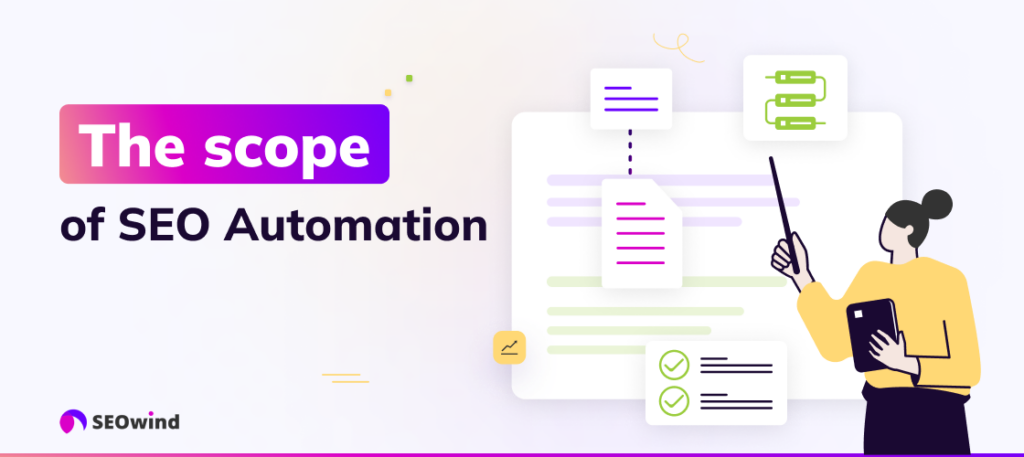
You’d be surprised at the range of tasks that can be automated with advanced software solutions. Let me share how we are automating SEO on a daily basis.

“Mind that automation without verification is a gamble. While automation speeds things up and scales execution, it’s not infallible. Tools can misinterpret data, generate low-quality output, or miss subtle strategic nuances. That’s why the most effective approach isn’t “set it and forget it” – it’s the CyborgMethod™: humans and machines working together. Utilize automation to handle the heavy lifting while maintaining human oversight of the results. Verify that the output aligns with your goals, that the content is suitable for your audience, and that it’s actually improving performance. Savvy marketers don’t just automate. They audit the automation.” Tom Winter, Founder at SEOwind
Automating Keyword Research
Keyword research is the foundation of successful SEO but can consume hours of manual effort. Modern automation tools transform this process:
These tools can analyze thousands of keyword variations in minutes, spot semantic relationships, and prioritize opportunities based on search volume, competition, and relevance. They can also group keywords by user intent and automatically cluster related terms for content planning.
Tools like Semrush and Ahrefs offer powerful features that identify keywords and track position changes over time. For example, Semrush’s Position Tracking tool can automatically send you ranking change notifications via weekly email reports, so you never miss important movements.
Timeline: Expect to spend 1-2 weeks setting up comprehensive keyword tracking and research automation, with minimal ongoing effort needed afterward.
Automating On-Page Optimization
On-page optimization involves many technical and creative elements – many of which can be efficiently automated:
Modern tools analyze top-ranking pages for your target keywords and identify patterns in content structure, heading usage, keyword density, and related semantic terms. They then provide specific recommendations for optimizing your content to match these successful patterns.
Automation is essential for consistently optimizing websites with hundreds or thousands of pages. Tools can identify under-optimized pages, prioritize them by potential impact, and suggest specific improvements.
Implementation requirements: It typically takes 1-3 months to fully implement on-page automation across a medium-sized website, with larger sites needing more time for proper setup and optimization.
Automating Technical SEO Audits
Technical SEO is the foundation of your site’s search visibility, but manually auditing large websites is nearly impossible. Automation makes comprehensive technical auditing doable:
Automated crawlers can regularly check your entire site for issues like:
- Broken links and 404 errors
- Duplicate content
- Missing meta tags
- Mobile usability problems
- Page speed issues
- Structured data validation
- XML sitemap errors
Scheduled automated audits ensure ongoing site health rather than one-time checks, alerting you to new issues as they happen rather than discovering them after they’ve already hurt your rankings.
Resource requirements: Technical audit automation typically needs a dedicated SEO professional or developer for initial setup (20-80 hours), with ongoing maintenance taking 5-10 hours monthly.
Automating Backlink Analysis and Management
Backlinks remain crucial for ranking, but analyzing and managing them manually is extremely time-consuming. Automation tools provide powerful solutions:
Automated backlink tools constantly monitor your link profile, identifying new, lost, and potentially harmful links that could trigger Google penalties. They can also compare your backlink profile to competitors, finding gap opportunities where competitors have valuable links you don’t.
Advanced tools can automatically categorize backlinks by quality, authority, relevance, and other factors, helping you prioritize outreach efforts and disavow toxic links.
Timeline expectations: Setting up comprehensive backlink automation typically takes 2-4 weeks, with results visible within 2-3 months as toxic links are removed and new opportunities are identified.
Automating Content Research and Creation
Content development is one of the most resource-intensive aspects of SEO, but automation can significantly streamline the process:
AI-powered content tools can analyze top-ranking content for any keyword and identify common topics, questions answered, content structure, and depth of coverage. This information creates data-driven content briefs that ensure comprehensive topic coverage.
Automation can also help scale content production. In one case study, implementing content automation features increased production from 3 to 30 articles per quarter (a 10x output) while achieving a 167% increase in organic traffic.
Implementation timeline: Content automation tools typically show initial results within 4-8 weeks, with significant traffic improvements occurring within 4-6 months as content begins ranking.
How SEOwind Helps with SEO Automation
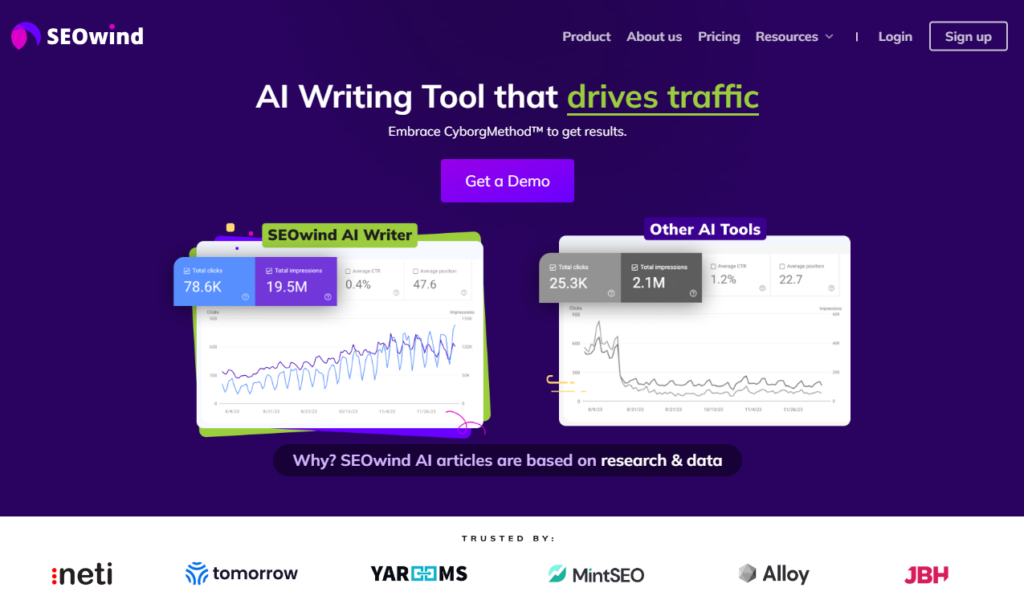
SEOwind is more than a writing tool. It’s your AI-powered SEO team in one platform. It automates and connects the entire content creation pipeline, from keyword research to article refinement. It uses intelligent agents that act on strategy, not scripts.
Keyword & Content Analysis with Built-in Research Agent
SEOwind uses AI-powered agents to analyze search trends, SERPs, and competitors, identifying high-impact keywords and decoding what makes top-ranking pages succeed. This isn’t just about volume and difficulty scores; it’s about understanding content depth, structure, EEAT signals, and semantic coverage.
The research agent scans synthesizes, and scores content opportunities with data-driven precision, helping you build strategies based on what’s winning, not what’s assumed.
Automating Brief Creation with SEOwind
Creating strong content starts with a strong brief. But building those briefs manually? It’s slow, inconsistent, and often based on gut instinct instead of data. SEOwind flips the script by fully automating brief creation, using AI agents that think like SEO strategists.
From Research to Brief. Instantly
SEOwind’s AI Research Agent pulls live SERP data, competitor content, and keyword intelligence to generate briefs that are:
- Structured for SEO
- Aligned with user intent
- Built to outperform what’s already ranking
The process eliminates guesswork and produces strategic, data-backed outlines in minutes.
What’s Inside Each Brief
Every brief includes:
- Suggested title and meta description
- H1–H4 heading structure based on SERP analysis
- Prioritized subtopics and content clusters
- Semantic keywords and related terms
- User questions from real searches
- Word count guidance per section
- Recommendations for improving EEAT signals
Writers don’t start from a blank page. They start with a blueprint designed to rank.
Built for Teams and Scale
SEOwind briefs are fully customizable and easy to share. You can:
- Add brand-specific messaging or product details
- Integrate internal linking strategies
- Export to Google Docs or your CMS
- Assign briefs directly to writers or collaborators
Whether you’re managing one writer or an entire content team, SEOwind creates a repeatable, scalable process.
The bottom line: SEOwind turns hours of research and planning into a few minutes of automation without sacrificing quality or strategy. Your content briefs get smarter, faster, and more consistent across the board.
AI Agents That Plan, Write & Refine
SEOwind doesn’t just outline content. It deploys a series of specialized agents that:
- Plan: Build smart SEO briefs with optimal headings, user intent-driven questions, and recommended structure.
- Write: Create first drafts aligned with search intent, keyword strategy, and EEAT principles.
- Refine: Use the AI Eval & Refine agent to critique and improve drafts for clarity, structure, topical completeness, and trust signals.
The result? Articles that rank, convert, and build authority with far less human effort.
Automating Content Updates with SEOwind
Most content update workflows are manual, chaotic, and reactive. SEOwind changes that by turning updates into a proactive, automated system driven by data and executed by intelligent AI agents.
Identify What Needs Updating. Automatically
SEOwind flags underperforming content using data from Google Search Console. It spots:
- Pages losing traffic or impressions
- Keywords with declining rankings
- Articles missing critical subtopics or EEAT elements
You don’t need to guess what’s outdated. The tool tells you, with reasons.
AI Agents Analyze, Rewrite, and Optimize
Once flagged, SEOwind’s Refine Agent takes over:
- Analyze your current content vs. top-performing competitors
- Suggests or rewrites outdated sections for clarity, completeness, and SEO relevance
- Aligns with EEAT best practices to improve trust, authority, and topical coverage
- Reoptimizes for keyword gaps, semantic richness, and internal linking
This is not “regenerate the post.” It’s a structured, context-aware revision built to rank better, without breaking what works.
Writing AI Articles Based on Data
Armed with all the revelations from previous steps, SEOwind takes automation to another level by drafting AI-based articles filled with insights drawn from meticulous research. It automatically integrates primary and secondary keywords while respecting necessary density limits. The process mimics experienced human writers, creating intuitive narratives, breaking complex ideas into digestible chunks, and using straightforward language throughout.
This unique machine involvement frees you up for other tasks without compromising quality or creativity. The software can output well-structured draft versions that may need minor copy-editing before publication, a small price for an immense time-saving utility.
And the advantages don’t stop after publication. SEOwind continues working behind the scenes to monitor traffic and suggest updates when needed, ensuring that your hard-earned rankings are upheld over time.
SEOwind streamlines tedious parts of SEO optimization, giving you more time to focus on crafting quality content and addressing users’ genuine needs instead of getting lost in technicalities.
Top SEO Automation Tools Comparison (2025)
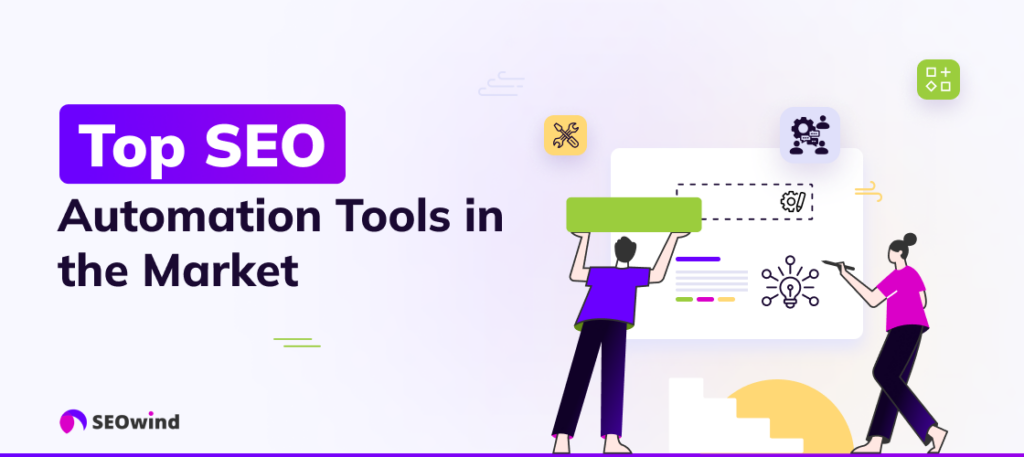
Consider your needs, budget, and existing workflows when picking SEO automation tools. Here’s a comparison of leading options with current pricing:
Enterprise-Level Tools
Semrush
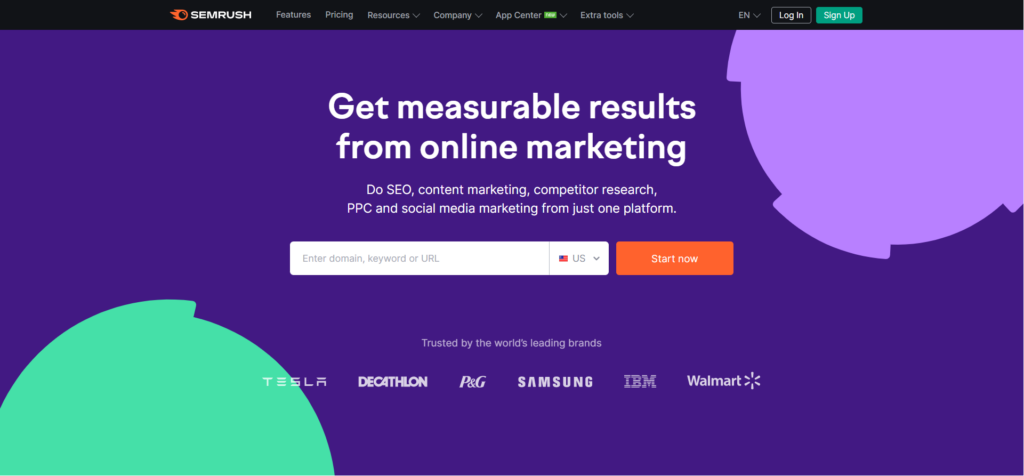
- Pricing: Starts at $129.95/month (2024 pricing)
- Key Features: Comprehensive keyword research, site auditing, rank tracking, competitor analysis
- Best For: Marketing agencies and larger businesses needing all-in-one capabilities
- Standout Feature: Agency-focused solutions that boost scalability and ROI
Ahrefs
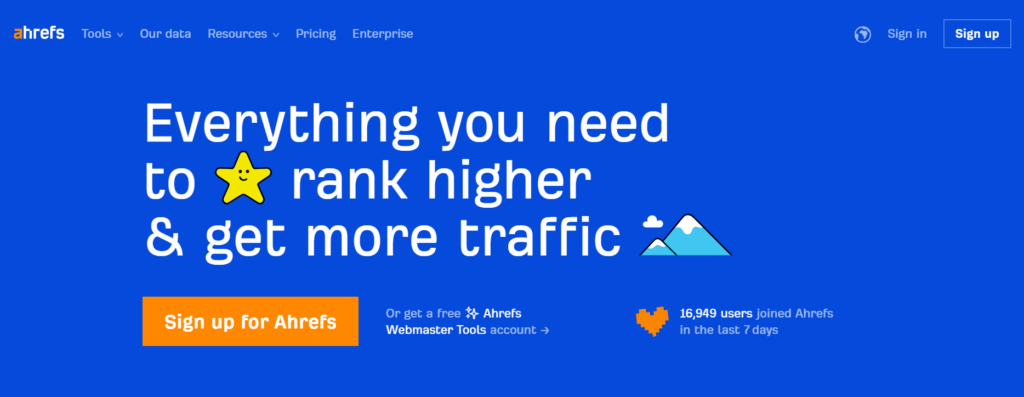
- Pricing: Full package from $199/month; Lite plan at $99/month (2024 pricing)
- Key Features: Superior backlink analysis, keyword research, content explorer, site audit
- Best For: SEO professionals focused on competitive analysis and link-building
- Standout Feature: Excellent data quality, especially for backlinks and competitor research
Moz Pro
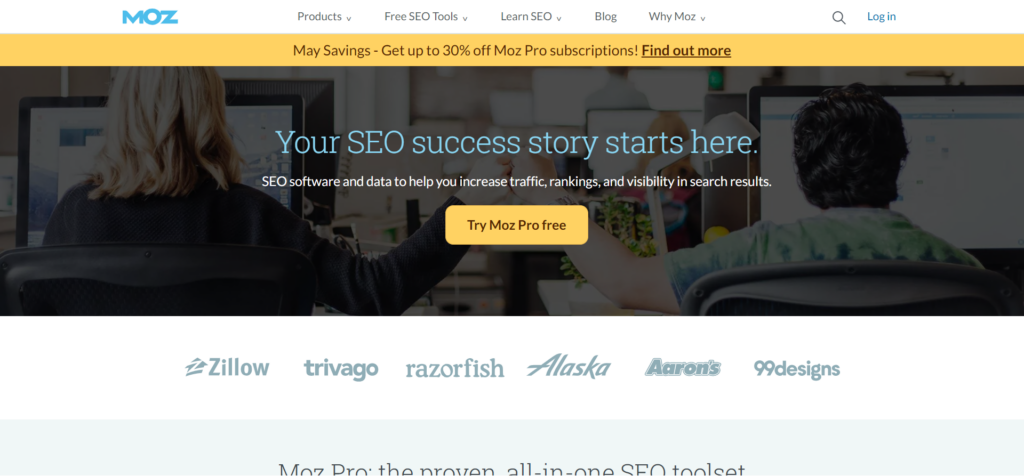
- Pricing: Tiered from $99/month (Standard) to $599/month (Premium)
- Key Features: Keyword Explorer, site audits, rank tracking, link research
- Best For: Businesses new to search engine optimization
- Standout Feature: Provides actionable insights without overwhelming users with excessive data
Small Business and Mid-Market Solutions
SEOwind
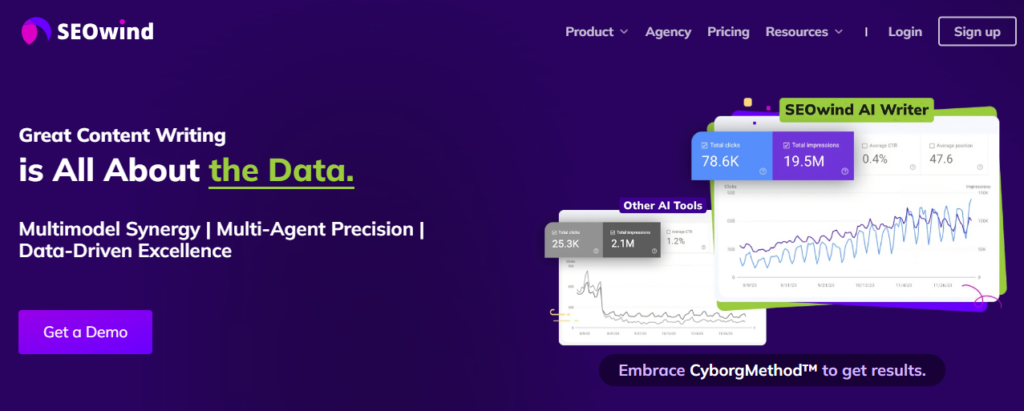
Pricing: Starts at $49/month (billed annually); Pro at $99/month, Agency at $299/month (2024–2025 pricing)
Key Features:
- AI-powered content brief and outline generation
- Automated SERP and competitor analysis
- Keyword clustering and research (including secondary keywords)
- Content structure and word count recommendations
- AI-generated titles, meta descriptions, and internal linking suggestions
- Integration with Google Docs and other workflows
- Custom brand voice, company/product info, statistics, and expert quotes1235
Best For:
Content marketers, SEO professionals, agencies, and small to mid-sized businesses aiming to streamline and scale high-quality SEO content production235.
Standout Feature:
Deep automation of the research and content briefing phase. SEOwind delivers highly detailed, data-driven content briefs by dissecting top-ranking SERP results, enabling teams to create SEO-optimized content faster and more effectively. What’s more it has AI Agents and AI workflows built-in to deliver E-E-A-T SEO optimized AI article and content updates. Its customization options and seamless integration with content workflows make it especially valuable for agencies and teams looking to boost efficiency and organic growth.
Frase
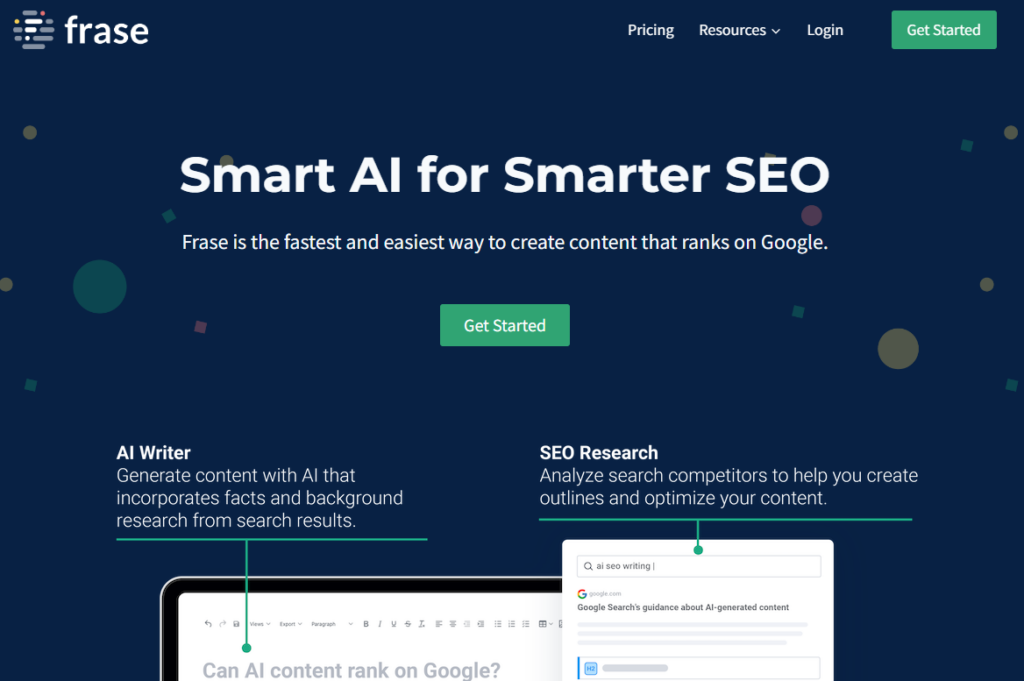
- Pricing: Starts at $45/month (Basic), $115/month (Team), with custom Enterprise options and a free trial available (2024–2025 pricing)
- Key Features: AI-powered content research and writing, automated content briefs, SERP and competitor analysis, content optimization scoring, outline builder, Google Docs and WordPress integrations, team collaboration tools, and multi-language support.
- Best For: Content marketers, SEO professionals, agencies, and teams seeking to accelerate and streamline the entire content workflow from research to optimization.
- Standout Feature: End-to-end SEO content workflow that turns keywords into well-researched, optimized articles in minutes. Frase’s Topic Score and AI-driven briefs help users fill content gaps and outperform competitors efficiently.
Clearscope
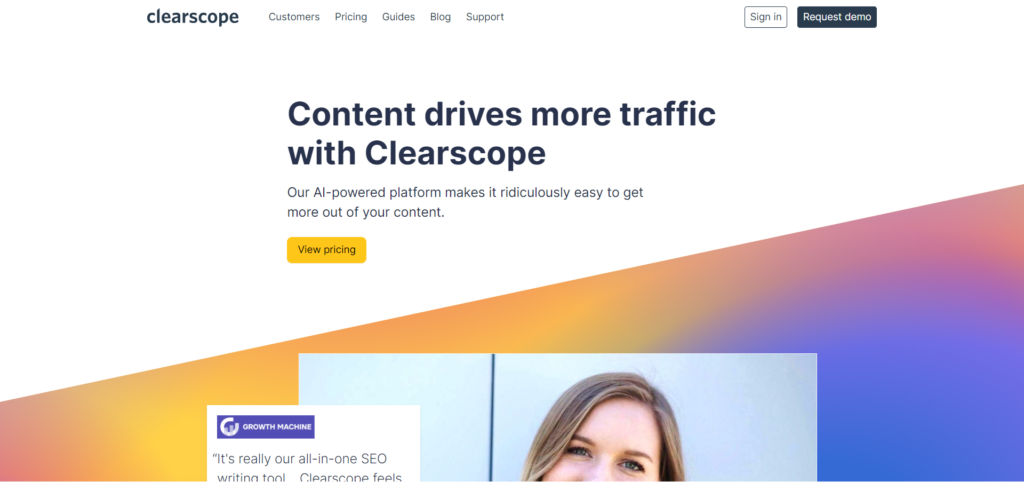
- Pricing: Starts at $189/month
- Key Features: AI-powered keyword research, content grading, actionable optimization recommendations, seamless integrations (Google Docs, WordPress)
- Best For: Marketers and content creators aiming to align content with search intent and maximize organic visibility
- Standout Feature: Data-driven keyword and content improvement suggestions that help teams optimize at scale while maintaining content quality
Free and Budget-Friendly Options
Google Search Console
- Pricing: Free
- Key Features: Performance reporting, indexing issues, mobile usability
- Best For: All websites, regardless of size
- Standout Feature: Direct integration with Google’s search data
Screaming Frog SEO Spider (Free Version)
- Pricing: Free version limited to 500 URLs
- Key Features: Technical auditing, crawl error detection
- Best For: Small websites needing technical analysis
- Standout Feature: Comprehensive technical insights, even in the free version
Identifying the right combination from this diverse array of automated SEO tools can heavily depend on your business requirements, preferred levels of involvement in daily tasks, budget limitations, and overall strategic direction for future SEO efforts.
Case Studies: SEO Automation Success Stories
Case Study 1: Nonprofit Center – Local Visibility Transformation
Despite offering valuable community services, a nonprofit center supporting children with special needs struggled with minimal online visibility.
Using Search Atlas’s OTTO automation module, they implemented:
- Automated optimization of page titles and meta descriptions
- Continuous content assessment for technical improvements
- AI-driven workflow for content evaluation and optimization
The results transformed their digital presence:
- Evolved from minimal online visibility to become a top local resource
- Reduced manual SEO effort by up to 90%
- Consolidated multiple tool subscriptions into one comprehensive solution
Case Study 2: Flyhomes – Massive Scale Through Automation
Flyhomes, an AI-powered real estate platform, needed to rapidly expand its content coverage across multiple cities and topics.
By implementing proprietary AI and SEO automation tools, they achieved:
- Expansion from 10,000 pages to over 425,000 pages in just 3 months
- Growth to over 1.1 million monthly visits
- An incredible 10,737% increase in traffic in three months
- 55.5% of total traffic generated by automated content on cost-of-living guides
This case demonstrates the remarkable scaling potential when combining AI content generation with SEO automation.
Emerging SEO Automation Trends for 2025
The SEO automation landscape keeps evolving rapidly. Industry experts highlight several key trends for 2025:
AI-Driven Predictive Analysis
AI has revolutionized SEO automation beyond basic content generation. According to recent industry insights, modern AI tools now handle a comprehensive range of tasks while providing predictive capabilities that enable organizations to:
- Forecast search trends before they become mainstream
- Identify shifts in consumer behavior
- Discover emerging market opportunities with greater accuracy
Answer Engines and AI Overviews
Industry predictions for 2025 suggest that answer engines will become the new search frontier. These systems aim to provide direct answers rather than links to information, fundamentally changing how users interact with search results.
Experts anticipate that AI Overviews will expand to all queries by 2025, representing a significant shift in how search engines present information.
Multimodal Content Optimization
Katie Morton, Senior Managing Growth Editor at Search Engine Journal, emphasizes that content strategists must adopt multimodal approaches that optimize text, audio, video, and image content to remain competitive in search rankings.
The CyborgMethod™: Balancing Automation with Human Expertise
While automation delivers tremendous value, the most effective SEO strategies combine technological efficiency with human insight. This balanced approach leverages the strengths of both machines and humans.
When Automation Excels
Automation performs best with:
- Repetitive, high-volume tasks
- Data analysis requiring pattern recognition
- Technical monitoring and auditing
- Generating first drafts based on structured inputs
- Scaling processes across large websites
Where Human Expertise Remains Essential
Humans continue to provide irreplaceable value in:
- Strategic planning and business alignment
- Creative ideation and storytelling
- Building genuine E-E-A-T signals
- Understanding subtle context and nuance
- Making judgment calls on ambiguous issues
- Developing brand voice and personality
The optimal approach combines these strengths, using automation to handle scale and repetition while preserving human oversight for strategy, creativity, and quality control.
Automation Workflows for Different Business Sizes
The optimal automation approach varies significantly based on your business size and resources.
Enterprise Automation Workflows
Large organizations typically need automation that:
- Integrates with existing martech systems
- Provides role-based access for large teams
- Offers detailed reporting for stakeholders
- Handles scale across thousands of pages
- Supports international SEO across multiple languages
Enterprise automation often focuses on creating efficient workflows between specialized teams – connecting insights from data analysts to content creators to developers.
Resource requirements: Enterprise SEO automation typically requires:
- 3-6 month implementation timeline
- A dedicated SEO team of 3-5 specialists
- Integration with existing business intelligence systems
- Executive buy-in for cross-departmental collaboration
Small Business Automation Workflows
Smaller organizations need automation that:
- Provides maximum impact with minimal learning curve
- Offers comprehensive solutions without requiring multiple tools
- Delivers actionable recommendations without requiring deep SEO expertise
- Prioritizes tasks by potential business impact
- Integrates with existing small business tools
Small businesses should focus on automation that provides guidance and execution – helping identify the highest priority tasks rather than streamlining all possible tasks.
Implementation timeline: Small businesses can typically implement core SEO automation within:
- 1-2 weeks for basic setup
- 1-3 months for comprehensive implementation
- Requiring 5-10 hours weekly of dedicated attention
Free Automation Solutions
Even with no budget, you can implement valuable automation through:
- Google Search Console alerts and scheduled reports
- Google Sheets with custom formulas for basic keyword tracking
- Free versions of tools like Screaming Frog (limited to 500 URLs)
- Browser extensions that automate routine SEO checks
- IFTTT or Zapier workflows with generous free tiers
These free options won’t provide the comprehensive capabilities of paid tools. Still, they can significantly reduce manual work and improve consistency.
Time investment: Expect to spend 10-15 hours initially setting up free automation workflows, with 2-3 hours weekly for monitoring and adjustments.
The Future of SEO Automation: Practical Applications
Rather than making abstract predictions, let’s explore emerging automation capabilities that offer practical value today:
AI Agents for Advanced Automation
The distinction between simple automation and AI agents represents a significant evolution.
As Tom Winter, founder of SEOwind, explains: “There are two primary modes of automation: workflows and AI agents. Workflows are repeatable processes: if-this-then-that systems for research, outlines, and drafts. AI agents go further. They’re autonomous problem-solvers that coordinate tools, optimize outputs, and act based on training data like tone, structure, and goals.”
These AI agents can handle increasingly sophisticated tasks like:
- Analyzing thousands of pages to identify content gaps and opportunities
- Creating customized content strategies based on competitor analysis
- Automatically refreshing underperforming content with updated information
- Detecting and responding to algorithm changes with recommendations
Automating Structured Data Implementation
Structured data (schema markup) helps search engines understand your content and can unlock rich results. New automation tools can:
- Automatically detect content types across your website
- Generate appropriate schema markup based on content analysis
- Validate implementation and monitor for errors
- Update schema as content changes
This automation helps websites maintain comprehensive, structured data without requiring constant developer resources.
Will AI automations replace SEO jobs in the future?
That sounds like a frightening question, doesn’t it? But let’s not jump to any hasty conclusions without examining the bigger picture.
The power of artificial intelligence to automate tasks can’t be understated. We’re seeing more and more businesses turn to automated SEO services when streamlining their digital marketing strategies. The result is increased efficiency and potential growth in site rankings.
However, despite the allure of AI-driven solutions, they cannot entirely eclipse human expertise within the realm of SEO.
AI won’t necessarily replace all SEO professionals. Instead, it will simply alter the nature of their work. Refining automation tools and interpreting the insightful data they procure will still underpin tasks that require a human touch.
The crux lies in blending AI capabilities with human intellect. By leveraging our unique skill sets: creativity, critical analysis, and strategic planning, we stay relevant in technological advancement.
Imagine how resourceful an SEO specialist becomes when able to execute mundane tasks quickly via automation and devote more time to strategy formulation or the creation of engaging content! This scenario showcases how humans can actually thrive alongside artificial intelligence rather than being overshadowed by it.
Ultimately, we must view machine learning as aiding rather than replacing us. It is an intelligent assistant deserving recognition for enhancing productivity while carrying out repetitive processes flawlessly.
So don’t worry! Though AI may change some aspects of SEO practice, it’s unlikely to wholly replace jobs filled by savvy, adaptable humans who can synthesize big-picture thinking with intricate insights gleaned from robust software solutions.
Instead of worrying whether your occupation might become obsolete due to technological progressions, you should focus on upgrading your skills and harnessing automated resources to stay up-to-date with dynamic industry trends.
AI is impressive, but its full application potential can only be achieved with human intervention. So, AI is revolutionizing SEO tasks for the time but is certainly not replacing humans entirely!
